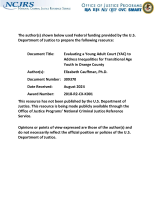Courts
Frye, Daubert, and PCAST: Countering Admissibility Challenges
This training was presented as a part of the National Center on Forensics conference at George Mason University on August 8th, 20
See the YouTube Terms of Service and Google Privacy Policy
Expert Testimony: Presenting Forensic Evidence in the Courtroom
George Mason University and the National Association of Attorneys General presents the National Center on Forensics Continued Training Plan to provide additional training sessions for more advanced information on the topics covered in the conference.
See the YouTube Terms of Service and Google Privacy Policy
Advanced Crime Scene Analysis
Reducing Courts’ Failure-to-Appear Rate by Written Reminders
Responding to Intimate Partner Violence Related Strangulation Integrating Policy, Practice, and Rese
This webinar examines the problem of Intimate Partner Violence Strangulation and an innovative response policy. The presentation will include an overview of the nature and extent of strangulation, its dangers, and adverse medical consequences followed by a review of a Strangulation Ordinance in Burleson, Texas that mandates extensive training for first responders and a city-wide response protocol for strangulation detection and investigation, documentation of strangulation signs and symptoms, medical assistance, and service referrals for strangulation survivors.
See the YouTube Terms of Service and Google Privacy Policy
Examining the Effects of Juvenile Drug Treatment Courts: A Systematic Review and Meta-Analysis
Mock Jurors’ Evaluations of Eyewitness Identification Evidence Based on Appearance Change and Associated Instructions
EFFECT OF MASSACHUSETTS' GUN CONTROL LAW ON GUN-RELATED CRIMES IN THE CITY OF BOSTON
COMPUTER'S USE IN JURY SELECTION AND MANAGEMENT - DO WE NEED TO WAIT FOR STATUTORY CHANGE?
UNIFIED COURT SYSTEMS - A RANKING OF THE STATES
MEDIATION AS AN ALTERNATIVE TO CRIMINAL PROSECUTIONIDEOLOGY AND LIMITATIONS
IMPROVING DEFENDER-CLIENT RELATIONS
EMERGING RIGHTS OF THE CONFINED - ACCESS TO THE COURTS AND COUNSEL
SENTENCING COUNCILS - A STUDY OF SENTENCE DISPARITY AND ITS REDUCTION
Advancing Justice for the Missing and Unidentified Through Research - 2024 NIJ Research Conference
Forensic science research is developing essential knowledge to fill in the holes in death investigations, creating new ways to identify challenging skeletal remains. These methods inform cause of death, time of death, and familial relationships to guide investigations, identify suspects, support prosecutions, and bring justice to families.
See the YouTube Terms of Service and Google Privacy Policy



